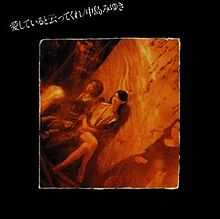Aishiteiru to Ittekure
| Aishiteiru to Ittekure | ||||
|---|---|---|---|---|
 | ||||
| Studio album by Miyuki Nakajima | ||||
| Released | April 10, 1978 | |||
| Recorded | Epicurus and the Hit Studios, Tokyo, Japan | |||
| Genre | Folk | |||
| Length | 40:00 | |||
| Label | AARD-VARK/Canyon, Yamaha Music Communications | |||
| Producer | Genichi Kawakami | |||
| Miyuki Nakajima chronology | ||||
| ||||
Aishiteiru to Ittekure (愛していると云ってくれ) is the fourth studio album by Japanese singer-songwriter Miyuki Nakajima, released in April 1978.
Five months before the album came out, she topped on the Oricon singles chart with a song "The Parting Song (Wakareuta)", which was released as her fifth single in September 1977.[1] The album features her commercial breakthrough single and another well-known song, "World's Context (Sejou)". The latter was later featured in the second series of TV drama Kimpachi Sensei aired on TBS in 1980,[2] and became known widely as one of her signature songs.
Aishiteiru to Ittekure has been her longest charting album on the Oricon, because the album re-entered the chart when "World's Context" was featured on TV program in the early 1980s.[3]
Track listing
All songs written and composed by Miyuki Nakajima, unless otherwise noted
Side one
All tracks arranged by Kinji Yoshino (except "The Parting Song" co-arranged by Shun Fukui)
- "Genki desuka (「元気ですか」)" (Poetry reading, sampling "Prelude, Fugue et Variation, Op. 18 " by César Franck on background music) – 2:58
- "Reiko (怜子)" – 2:40
- "The Parting Song (わかれうた Wakareuta)" – 3:57
- "Uminari (海鳴り)" – 3:27
- "Keshou (化粧)" – 5:07
Side two
All tracks arranged by Kinji Yoshino (except "World's Context" co-arranged by Shun Fukui, "Milk 32" and "Omae no Ie" arranged by Miyuki Nakajima)
- "Milk 32 (ミルク32 Miruku 32)" – 4:33
- "Ahoudori (あほう鳥)" – 4:06
- "Omae no Ie (おまえの家)" – 6:32
- "World's Context (世情 Sejou)" – 6:12
Personnel
- Miyuki Nakajima – vocals, acoustic guitar
- Toshiro Masuda – electric guitar
- Tsugutoshi Goto – electric bass
- Ryuichi Sakamoto – keyboards
- Nobu Saito – percussions
- Hiro Tsunoda – drums
Production
- Recording director; Yoshio Okushima
- Recording and Mixing Engineer; Yoshihiko Kan'nari
- Assistant engineer; Koji Sakakibara
- Manager; Kunio Kaneko
- Director; Yūzō Watanabe
- Cover designer; Natsuo Ueda
- Photographer; Jin Tamura
- Executive producer; Genichi Kawakami
Chart positions
| Year | Country | Chart | Position | Weeks | Sales |
|---|---|---|---|---|---|
| 1978–1981 | Japan | Oricon Weekly LP Albums Chart (top 100) [3] | 2 | 82 | 410,000+ |
| Oricon Weekly CT Albums Chart (top 100) [3] | 6 | 41 | |||
References
- ↑ "List of number-one singles on the Oricon chart in Japan". Original Confidence (in Japanese). Retrieved 2008-10-21.
- ↑ "Production details of the DVD Kimpachi Sensei; Second Series" (in Japanese). Archived from the original on 20 September 2008. Retrieved 2008-10-21.
- ↑ 3.0 3.1 3.2 a-中島みゆき "- Yamachan Land (Archives of the Japanese record charts) - Albums Chart Daijiten - Miyuki Nakajima" (in Japanese). December 30, 2007. Retrieved October 25, 2009.
| ||||||||||||||||||||||||||